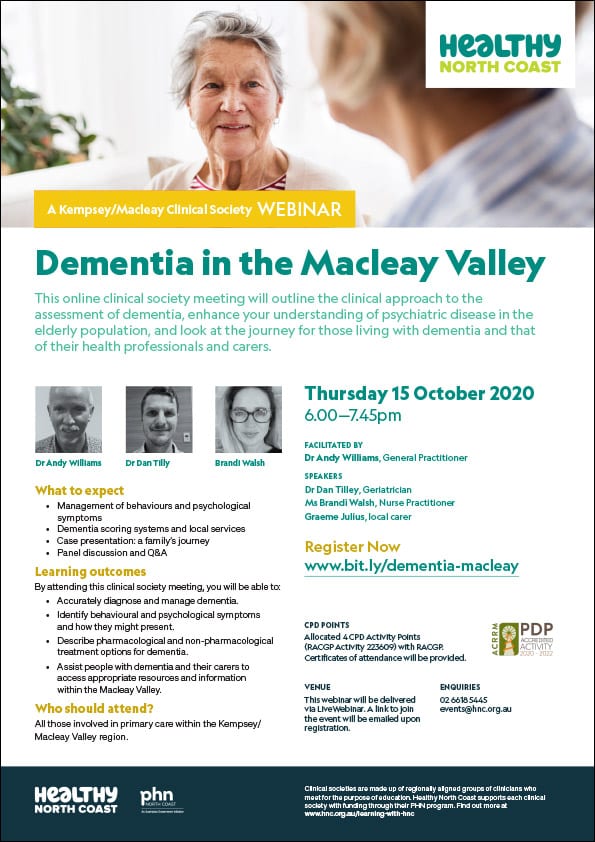The Kempsey Macleay region has a new Healthy North Coast Clinical Society. The society’s first event is on Thursday 15 October from 6pm – 7:45pm. It will focus on dementia in the Macleay Valley.
The free-to-join online webinar will:
- Outline the clinical approach to the assessment of dementia.
- Enhance understanding of psychiatric disease in the elderly population.
- Look at the journey for those living with dementia and that of their health professionals and carers.
About the Kempsey Macleay Clinical Society
The Kempsey Macleay Clinical Society is supported by funding from Healthy North Coast through the Australian Government’s PHN Program. The Society is led by a regionally aligned group of clinicians who meet for the purpose of planning localised continued professional development education.
Sharon Aulsebrook, a Practice Nurse at AB Surgery and Durri Aboriginal Corporation Medical Service says she is thrilled to be part of the establishment of Kempsey’s own Clinical Society.
“I have been working as a Practice Nurse in primary health for the past 7 years in Kempsey. I am passionate about promoting and encouraging healthy lifestyles in our community and I love the fact that working in primary health, we can educate and promote prevention of disease.
My hope and wish for the Kempsey/Macleay Clinical Society is that we can provide education, support and networking for health care providers working in primary health care in our local area. When pandemic free, the events will be face to face and a great way to get to know one another.
I love the fact that working in primary health, we can educate and promote prevention of disease. As clinicians, we quite often work independently, often remotely and can feel isolated. Hopefully, this initiative will address these issues, and the Society will be well received and supported.”
The goal of the Kempsey Macleay Clinical Society is to:
- Foster integration and be inclusive of multidisciplinary members
- Present clinical topics that are locally relevant and prioritised according to locally specific clinical needs or key regional health priorities
- Highlight priorities and opportunities for growing local clinical communities
- Have clearly articulated learning outcomes for each session, with the content designed to meet the learning outcomes
- Present evidence-based content that reflects best practice
- Be interactive and reflective of adult learning principles
- Meet professional development accreditation standards for CPD to be formally recognised
Healthy North Coast will support the Kempsey Macleay Clinical Society with:
Meeting support including:
- Booking and payment of venues; management of registrations; room or webinar set up; catering arrangements
- Promoting the event
- Publishing teaching materials and presenter’s slides when required
- Development and administration of evaluations
- Completion of documentation required for events to be accredited
- Provision of records of attendance
Payment for lead clinicians to:
- Undertake professional development opportunities to assist in the development of skills related to leading education topics
- Liaise with Healthy North Coast Clinical Educators to develop and document learning outcomes
- Engage with locally relevant presenters and brief them about the learning outcomes and the approach to achieve them
- Build local networks and encourage local participation
A big thank you to the lead clinicians currently involved in the Kempsey Macleay Clinical Society:
- Dr Cameron James, General Practitioner, AB Surgery
- Dr Colin Farquharson, General Practitioner, Kempsey Medical Centre
- Michael Kemp, Physiotherapist, Keystone Health
- Sharon Aulsebrook, Practice Nurse, AB Surgery
If you would like to get involved in this regionally aligned group, or be part of a clinical society in your own region, please contact:
Dr Andy Williams
Clinical Educator, Healthy North Coast
[email protected]
Visit HealthPathways to learn more about Dementia and Cognitive Impairment.
Username: manchealth
Password: conn3ct3d




